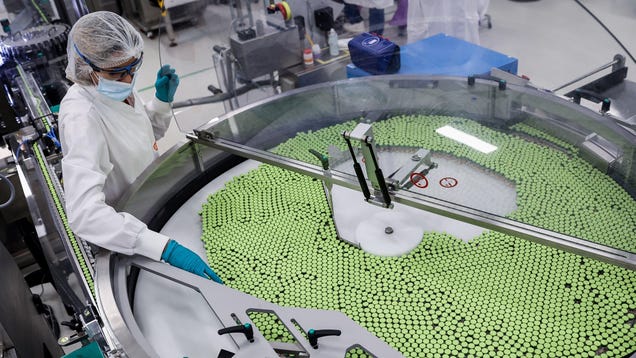In the following tutorial, you will learn how to install the Nvidia Graphic Drivers from the Nvidia Proprietary Repository RPM Fusion on AlmaLinux 9.
Source: LXer – How to Install NVIDIA Drivers on AlmaLinux 9
Monthly Archives: May 2022
GlaxoSmithKline Buys New Vaccine Developer Affinivax in $3.3 Billion Deal

UK-based drug company GlaxoSmithKline will buy Boston-based vaccine developer Affinivax for $2.1 billion, according to press releases issued by the two companies early Tuesday. GSK will also pay up to $1.2 billion more if certain milestones are reached in Affinivax’s upcoming clinical trials for a new pneumococcal …
Source: Gizmodo – GlaxoSmithKline Buys New Vaccine Developer Affinivax in .3 Billion Deal
Nouveau Gallium3D Begins Landing RTX 30 "Ampere" GPU Driver Code
Early bits of NVIDIA GeForce RTX 30 “Ampere” support were merged today into Mesa 22.2…
Source: Phoronix – Nouveau Gallium3D Begins Landing RTX 30 “Ampere” GPU Driver Code
Singapore Starts Digital-Asset Initiative
Singapore has begun a project to investigate potential uses of asset tokenization as the city state looks to establish itself as a hub for decentralized finance after several key crypto players left. From a report: “Project Guardian,” a collaboration between the Monetary Authority of Singapore and the finance industry, will test the feasibility of applications in asset tokenization and decentralized finance (DeFi) while working to manage risks to financial stability and integrity, according to a statement from Deputy Prime Minister Heng Swee Keat on Tuesday.
The project aims to develop and pilot use cases in areas including open, interoperable networks; trust anchors; and institutional-grade DeFi protocols. The first pilot in the project will explore potential DeFi applications in wholesale funding markets. The pilot, led by DBS Bank, JPMorgan Chase and Marketnode, involves the creation of a permissioned liquidity pool comprising tokenized bonds and deposits. The MAS was relatively early among regulators to look at uses of blockchain technology, and Singapore set up a licensing regime a few years ago. However, applicants have been frustrated by the slowness of approvals, and a crypto advertising ban caught the industry off guard.
Read more of this story at Slashdot.
Source: Slashdot – Singapore Starts Digital-Asset Initiative
Celebrating the community: Jay
We love being able to share how young people across the world are getting creative with technology and solving problems that matter to them. That’s why we put together a series of films that celebrate the personal stories of young tech creators.

For our next story, we met up with young digital maker Jay in Preston, UK, who wants to share what coding and robotics mean to him.
Watch Jay’s video to see how Jay created a homemade ventilator, Oxy-Pi, and how he’s making sure people in his local community also have the opportunity to create with technology.
Meet Jay
Jay (11) wants everyone to learn about programming. At a young age, Jay started to experiment with code to make his own games. He attended free coding groups in his area, such as CoderDojo, and was introduced to the block-based programming language Scratch. Soon Jay was combining his interests in programming with robotics to make his own inventions.
“My mission is to spread the word of computing and programming, because not many people know about these subjects.”
Jay

When he found out about Coolest Projects, our global tech showcase where young creators share their projects, Jay decided to channel his creativity into making something to exhibit there. He brought along a security alarm he had built, and he left Coolest Projects having made lots of new friends who were young tech creators just like himself.
“With robotics and coding, what Jay has learned is to think outside of the box and without any limits.”
Biren, Jay’s dad
While Jay has made many different tech projects, all of his ideas involve materials that are easily accessible and low-cost. Lots of his creations start out made with cardboard, and repurposed household items often feature in his final projects. Jay says, “I don’t want to spend much money, because it’s not necessary when you actually have an alternative that works perfectly fine.”

One of Jay’s recent projects, which he made from repurposed materials, is called Oxy-Pi. It’s a portable ventilator for use at home. Jay was inspired to make Oxy-Pi during the COVID-19 pandemic, and this project is especially important to him as his dad was hospitalised during this time. With his digital making approach, Jay is an example to everyone that you can use anything you have to hand to create something important to you.

Digital making has helped Jay express himself creatively, test his skills, and make new friends, which is why he is motivated to help others learn about digital making too. In his local community, Jay has been teaching children, teenagers, and adults about coding and robotics for the last few years. He says that he and the people around him get a lot from the experience.
“When I go out and teach, I love it so much because it’s really accessible. It helps me build my confidence, it helps them to discover, to learn, to create. And it’s really fun.”
Jay
Using tech to create things and solve problems, and helping others to learn to do the same, is incredibly important to Jay, and he wants it to be important to you too!
Help us celebrate Jay and inspire other young people to discover coding and digital making as a passion, by sharing his story on Twitter, LinkedIn, and Facebook.
The post Celebrating the community: Jay appeared first on Raspberry Pi.
Source: Raspberry Pi – Celebrating the community: Jay
A Fix Is On The Way For A Previously-Reported Linux 5.18 Performance Regression
Back during the Linux 5.18 merge window in March I wrote about a big NUMA benchmark performance regression I noticed and bisected. It turns out there has been a fix for it in patch form albeit I only noticed this weekend and now was able to successfully test and verify the fix. That fix is now working its way to the mainline kernel…
Source: Phoronix – A Fix Is On The Way For A Previously-Reported Linux 5.18 Performance Regression
Firefox 101 Released With Few Notable Changes
Mozilla Firefox 101 is officially meeting the world today. One week after Google’s Chrome 102, it’s now time for Mozilla’s new monthly update on the Gecko side with Firefox 101…
Source: Phoronix – Firefox 101 Released With Few Notable Changes
France officially bans English gaming terms like 'eSports' and 'streaming'
English jargon has invaded every corner of France, causing consternation among language purists — a trade fair popular with politicians during election season is called “Made in France,” for example. Despite widespread usage in business and elsewhere, the government has decided to pick on gaming, officially banning terms like “streamer” and “cloud gaming,” according to AFP. Going forward, the far more convoluted terms joueur-animateur en direct and jeu video en nuage must be used for any government communications.
The changes were made in consultation with France’s Ministry of Culture, which has in the past touted the gaming industry as a French economic success story. However, it told the AFP it’s concerned that English terms could become a “barrier to understanding” for non-gamers. (That’s a solid point, as I can attest that many French non-gamers wouldn’t have a clue what a term like “streaming” means.) France’s language keepers, l’Académie française, has also expressed concern about English jargon in gaming, having published a lexicon of alternate French terms back in 2017.
The changes were issued in the government’s official journal, meaning they’re binding on all government workers. However, it’s hard to see them catching on in daily use or even on French websites or newspapers. Previous efforts by l’Académie française to replace anglicisms have not gone well — its attempt to get people to use l’access sans fil à internet instead of le wifi failed completely, as The Local France points out.
Source: Engadget – France officially bans English gaming terms like ‘eSports’ and ‘streaming’
NFSv4 "Courteous Server" Lands As Part Of Linux 5.19 NFSD Changes
The NFS server (NFSD) changes have been merged into the Linux 5.19 kernel and a new feature this cycle is supporting the NFSv4 “Courteous Server” functionality…
Source: Phoronix – NFSv4 “Courteous Server” Lands As Part Of Linux 5.19 NFSD Changes
Clang RandStruct Lands As Part Of Kernel Hardening For Linux 5.19
Merged into the mainline Linux 5.19 kernel last week was the latest batch of kernel hardening work, which includes introducing the Clang RandStruct support and other changes to beef up the kernel’s defenses…
Source: Phoronix – Clang RandStruct Lands As Part Of Kernel Hardening For Linux 5.19
elementary OS 7 "Horus": Expected New Features
A highlight of the expected new features of elementary OS 7 “Horus” which caters to changes across look-and-feel, features and performance.
Source: LXer – elementary OS 7 “Horus”: Expected New Features
France Bans English Gaming Tech Jargon in Push To Preserve Language Purity
French officials are continuing their centuries-long battle to preserve the purity of the language, overhauling the rules on using English video game jargon. From a report: While some expressions find obvious translations — “pro-gamer” becomes “joueur professionnel” — others seem a more strained, as “streamer” is transformed into “joueur-animateur en direct.” The culture ministry, which is involved in the process, told AFP the video game sector was rife with anglicisms that could act as “a barrier to understanding” for non-gamers. France regularly issues dire warnings of the debasement of its language from across the Channel, or more recently the Atlantic. Government officials must replace words such as “e-sports” and “streaming” with approved French versions, the new rule says.
Read more of this story at Slashdot.
Source: Slashdot – France Bans English Gaming Tech Jargon in Push To Preserve Language Purity
Dynamically linking libraries while compiling code
Compiling software gives you a lot of flexibility in how you run your system. The LD_LIBRARY_PATH variable, along with the -L and -l GCC options, are components of that flexibility.
Source: LXer – Dynamically linking libraries while compiling code
Excellent Utilities: Whoogle Search – self-hosted metasearch engine
Whoogle Search is a privacy-focused search engine. It displays the same results as Google Search but without ads/sponsored content, JavaScript, cookies, or tracking.
Source: LXer – Excellent Utilities: Whoogle Search – self-hosted metasearch engine
Hit Hard by High Energy Costs, Hawaii Looks To the Sun
Nearly a third of Hawaii’s single-family houses have rooftop solar panels — more than twice the percentage in California — and officials expect many more homes to add panels and batteries in the coming years. From a report: Even before energy prices surged globally this year, homeowners, elected leaders and energy executives in Hawaii had decided that rooftop solar panels were one of the best ways to meet demand for energy and tame the state’s high power costs. Russia’s invasion of Ukraine has only strengthened the state’s embrace of renewable energy. Electricity rates in Hawaii jumped 34 percent in April from a year earlier because many of its power plants burn oil, about a third of which came from Russia last year.
While Hawaii faces unique challenges, the state’s reliance on solar carries lessons for other states and countries looking to fight climate change and bring down energy costs. The state has increased the use of renewable energy in large part by getting electric utilities to accept rooftop solar rather than fight it, as energy companies in California, Florida and other states have been doing. “In Hawaii, we’ve come to the recognition that rooftop solar is going to be an important part of our grid, has to be part of our grid,” said Shelee Kimura, president and chief executive of Hawaiian Electric Company, the state’s largest power provider. “Some people think we’re crazy. Some people think we’re pretty amazing.”
Read more of this story at Slashdot.
Source: Slashdot – Hit Hard by High Energy Costs, Hawaii Looks To the Sun
Elden Ring Gets 'Seamless' Co-op With New Mod

While Elden Ring is technically playable in co-op, the convoluted way developers FromSoftware have implemented the mode means hardly anybody ever bothers. That’s about to change, thanks to this incredible mod by LukeYui.
Source: Kotaku – Elden Ring Gets ‘Seamless’ Co-op With New Mod
9to5Linux Weekly Roundup: May 29th, 2022
The eighty-seven installment of the 9to5Linux Weekly Roundup is here for the week ending on May 29th, 2022, keeping you guys up to date with the most important things that are happening in the Linux world.
Source: LXer – 9to5Linux Weekly Roundup: May 29th, 2022
Environmental Costs of SUVs
Akihabara News (Tokyo) — According to the International Energy Agency (IEA), a Paris-based intergovernmental organization, emissions from SUVs have grown to become the second-largest source of carbon released into the atmosphere between 2010 and 2021.
Only the energy sector continues to produce more carbon emissions, with SUVs surpassing shipping, aviation, heavy industry, and even trucks.
In 2021, SUVs produced 900 million tons of carbon globally, meaning that if SUVs were a nation, they would rank just below Russia in terms of total emissions.
On average, SUVs produce 14-20% more carbon emissions than a medium-sized car.
“SUVs are typically around up to 250 kilograms heavier than a conventional hatchback and, being taller, have worse aerodynamics as a result of the bigger frontal area, leading to higher fuel consumption and, therefore, higher CO2 emissions,” wrote Florent Grelier in a recent report on carbon emissions released by the campaign group Transport & Environment (T&E).
T&E also noted that while the footprint of SUVs is nearly identical to most medium-sized cars, they are taller. This increased height makes them eleven times more likely to roll over during a collision. In accidents involving pedestrians, injuries are more likely to be fatal, because victims are struck in the torso as opposed to the legs.
On the other hand, most drivers perceive the higher cabin position and increased weight of SUVs as providing increased visibility and safety, despite the larger blind spot immediately in front of the vehicle.
The global fleet of SUVs has increased from about 50 million in 2010 to around 320 million in 2021. In the last year alone, the SUVs increased by over 35 million, according to the IEA, indicating that sales have remained robust throughout the pandemic.
With a powerful advertising apparatus at its disposal, automotive companies have leveraged people’s desire for safety, ruggedness, and dependability, creating a generational shift in purchasing preferences away from sedans and toward SUVs.
These automotive companies have also tapped into the market appeal of vehicles capable of operating in various terrains and weather conditions, even if the reality is that most buyers will never use their SUV outside of an urban setting.
Dynamic images of SUVs tackling off-road environments with ease in sunshine, rain, or snow has created an aura of freedom and independence that has become part of the allure of this vehicle class.
Such marketing campaigns have been successful, with four out of every ten vehicles sold globally in 2018 being a SUV, according to the IEA. In the United States, the average is even higher with SUVs being one out of every two vehicles sold, and in Europe the average is slightly lower, at one in three.
The increased popularity of SUVs, however, has come at the expense of the global climate. More fuel-efficient classes of vehicles have been replaced by an inefficient class with little regard to the impact on global warming.
While many automotive companies do promote greener vehicles, most sales are not of climate-friendly Electric Vehicles (EVs), but rather gasoline-powered.
In an interview last week with Nation of Change, a progressive news outlet based in the United States, Karen Sokol, a professor at Loyola University New Orleans College of Law, stated, “The companies are making a lot of money from SUVs, so they continue to market those, but emphasize sales of EVs at the same time. The danger is that company ads risk allowing them to continue business as usual.”
Recent Electric Vehicle Related Articles
Japan Automakers Dead Last in EV Forecast
Japan Automakers Playing Catch-Up on Electric Vehicles
Nissan Keeps Delaying Ariya Launch
Nissan Alliance Set To Triple EV Investment
Toyota’s First All-Electric SUV
The post Environmental Costs of SUVs appeared first on Akihabara News.
Source: Akihabara News – Environmental Costs of SUVs
India Withdraws Warning on Biometric ID Sharing Following Online Uproar
India has withdrawn a warning that asked users to not share photocopies of their national biometric ID following a widespread uproar from users on social media, many of whom pointed that this is the first time they were hearing about such a possibility. From a report: A regional office of UIDAI, the body that oversees the national biometric ID system Aadhaar, warned users on Friday that “unlicensed private entities” such as hotels and theatre halls are “not permitted to collect or keep copies of Aadhaar,” a 12-digit unique number that ties an individual’s fingerprints and retina scan, and people should avoid sharing photocopies of their Aadhaar to prevent misuse.
Read more of this story at Slashdot.
Source: Slashdot – India Withdraws Warning on Biometric ID Sharing Following Online Uproar
New Ni No Kuni Game Is Absolutely Rotten With Crypto Garbage

Hey, there’s a new Ni No Kuni game out! And it looks beautiful! This should be cause for celebration, but we don’t deserve nice things. So instead, we have got a mobile/PC gacha game that is built on a foundation of crypto nonsense.
Source: Kotaku – New Ni No Kuni Game Is Absolutely Rotten With Crypto Garbage
